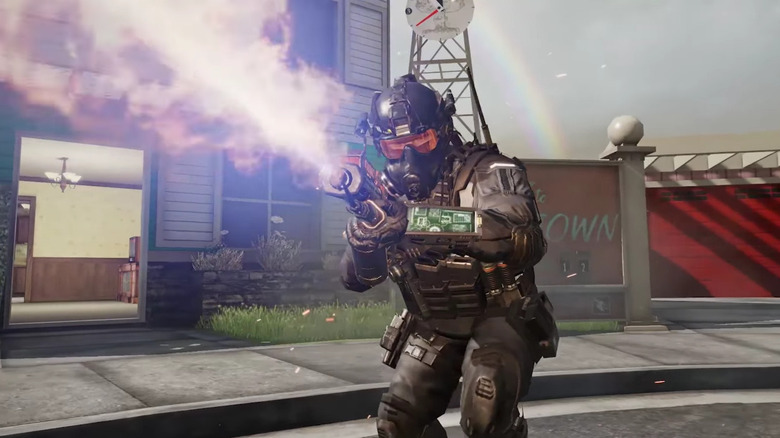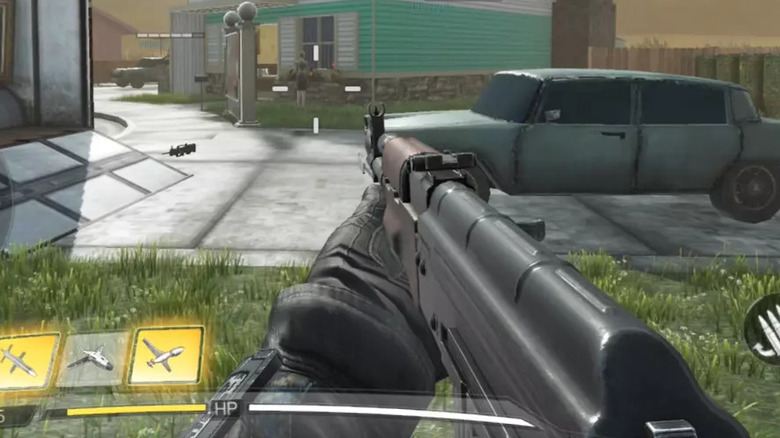The Untold Truth Of The Biggest Game Cheating Ring In The World
Cheaters are ruining online gaming. It seems like there's a new cheating scandal infuriating professional and casual players every single week. "Fortnite" might take the prize for most cheaters, but even longtime franchises like "Call of Duty" are being overrun by cheaters. With competitive games and battle royales sometimes putting thousands of dollars up for grabs in tournaments, there's more incentive for players to cheat, but the money they stand to make is nothing compared to what some people earn from developing the hacks that dishonest players love to use.
In just over three years, Cheat Ninja — one of the most prominent cheat developers for games like "PUBG," "Fortnite," and "Call of Duty: Mobile" — made tens of millions of dollars. That's more money than some more legitimate developers will see over the course of their entire careers. The financial incentive for cheat devs is bigger than ever, but so is the risk they take on by getting into the market. Game companies are desperate to shut down cheating operations in order to save their games, and some of them have more resources than others.
The members of Cheat Ninja went from being millionaires to facing legal penalties and possible jail time. From rise to fall, fortune to infamy, this is the untold truth of the biggest game cheating ring in the world.
Not that kind of Catfish
Thanks to encrypted messaging apps and cryptocurrency trade, it can be nearly impossible to track down cheaters and cheat developers, even when they're working in a large group. When the Chicken Drumstick cheating ring finally began to fall apart after a lengthy investigation by Chinese authorities, it fell in chunks. According to a report from Vice, 10 cheat resellers were arrested in 2020, and then two of the ring's main salespeople were caught.
As more and more members of the cheating ring found police at their doors, some were able to send messages warning the others. The ring's lead salesperson, who goes by the name "IIIIIIIII" online, contacted the ring's main organizer before he was arrested. The organizer now goes by the alias "Catfish," as he believes his other aliases have been compromised.
Catfish shut down the ring's main website and literally smashed his computer to bits with a hammer before going into hiding. He's been willing to give interviews to a few news outlets, but has mostly been laying low since the summer of 2021, doing his best to avoid attracting the attention of Chinese authorities.
Chicken Drumstick
Catfish told Vice that he originally developed his cheats for "Player Unknown Battlegrounds" and branded them under the name Sharpshooter. As his cheats became more popular, he started developing for more games and needed new infrastructure to support his booming business.
When Catfish built an entire ecosystem to support the sale of the cheats he and his team were creating, he changed the name to Cheat Ninja. By that point, the group had a dedicated Cheat Ninja Telegram channel and a variety of websites that they used to promote their software.
Chinese law enforcement worked alongside game developer Tencent to shut down the cheating ring that was wreaking havoc in the company's games. They referred to the group as Chicken Drumstick, a nickname that stems from the phrase "winner winner chicken dinner," which gets displayed for the winning team in "PUBG" matches. Now all the infrastructure that Catfish and his team built is gone, but there's no shortage of copycat sites branding themselves under one of the various names that used to refer to Catfish's operation.
Catfish never meant to become a cheat developer
Just about every gamer alive gets frustrated when they end up in a game with cheaters. Cheating is a plague that ruins competitive games and can take all the fun out of playing. As strange as it sounds, some of the people creating cheats for popular games feel the same about them as regular players. In his interview with Vice, Catfish explained that his cheating operation actually began as a personal response to his own encounters with cheaters in "PUBG."
Near the end of 2017, Catfish and his friends ran into cheater after cheater while playing on PC. And if you can't beat them, join them, right? Catfish decided that he would create his own cheats to get ahead of the other cheaters ruining his game. "PUBG Mobile" launched shortly thereafter, and so Catfish made sure his cheats worked on iOS, too.
After all the work it took to develop cheats for two separate operating systems, Catfish thought he'd give selling his work a shot, but he never expected the response he got. "It sold thousands of copies within a few days," he said, adding, "I think we earned tens of thousands of Chinese Yuan within not even a week." Catfish hadn't intended to become the head of a cheating organization, but he couldn't pass up a life-changing financial opportunity.
Starting small
As Catfish tells it, Cheat Ninja began as just him and one friend selling two different versions of a "PUBG" cheat. While both versions were popular, it was the iOS version of the cheat that shot their operation into the stratosphere.
"People just had never seen this kind of cheat on mobile before," Catfish explained. Because the cheat needed to be constantly updated, partially with new features and partially with new ways to get around Tencent's ever-evolving anti-cheat systems, Catfish sold a monthly subscription to the cheat for around $15. The influx of money helped him to hire more developers who could keep up with Tencent's strategies.
Of course, Catfish and his coworkers knew that what they were doing was illegal in China, and at any moment, they could be caught and fined, or jailed for what they were doing. However, just as Catfish's first round of selling his cheats convinced him it was worth the risk to expand his operation, the expanded sales also made everyone involved realize there was no turning back.
Catfish says that the money they were making was "totally not the norm of the cheat market," but the group quickly came to dominate the Chinese market. In 2018, they were averaging a thousand new subscribers every day and pulled in roughly $350,000 each month.
Going global
Catfish's "Sharpshooter" cheat was making more money than he had ever imagined. Despite the sudden and outrageous success, a plateau was on the horizon. In 2019, Sharpshooter was strictly a "PUBG" cheat, and it was only sold in China. Catfish knew that in order to keep the business going, he would have to expand. He partnered with even more developers and resellers, and in 2020 rebranded the operation as Cheat Ninja (via Vice).
The group began creating cheats for other popular games, like "Call of Duty" and "Fortnite." They also opened up sales internationally, with India and countries in the Middle East becoming their new hotspots. All that expansion didn't just prevent their sales from dropping, it also helped to push them over the $400,000 per month mark. The numbers were great, but Catfish said that business was "not exactly smooth sailing," because "PUBG," still the group's biggest draw, was losing some of its popularity.
Making matters worse, authorities in China were cracking down on cheat resellers across the country. There was disaster on the horizon.
Cheat Ninja is officially busted
Cheating ruins games for players, and that in turn can be incredibly damaging for game developers. Tencent, the Chinese game developer behind "PUBG" and "Call of Duty: Mobile" has long been invested in cracking down on cheating in whatever ways they can. In 2018, as reported by Game Developer, Tencent worked with police to arrest 15 cheat creators and sellers. It wasn't long after this arrest that Cheat Ninja landed on the company's radar.
Catfish told Vice that he knew Tencent and Chinese authorities were closing in on his group in 2020. As he explained, "They had been arresting our resellers in China left and right for over a year." It would be hard for the most popular "PUBG" cheat operation in China to avoid the scrutiny of authorities. Cheat Ninja had nearly 600,000 subscribers by late 2020. In January 2021, Chinese police arrested Catfish's two sales leads, who were referred to by authorities as He and Wang. Before being arrested, one of the leads managed to send out a message to Catfish, giving him a heads up. Catfish destroyed his computers and informed his subscribers of Cheat Ninja's impending shutdown.
In March of that year, police managed to arrest 10 people allegedly involved with Cheat Ninja. Even more shocking than the arrests themselves were the assets that police were able to seize on the scene. BBC reported that the group of 10 had roughly $46 million worth of loot from the cheating operation with them at the house when police arrived, "including several luxury cars." It was the single largest video game cheating bust in the world, and it effectively ended the chances that Cheat Ninja would ever be revived.
Tens of millions of dollars
The amount of money seized by police when they busted the remains of Cheat Ninja in March 2021 certainly raised eyebrows, but that wasn't even all of the money made by the cheating ring. The police claimed that the organization had done somewhere around $77 million in revenue over the course of its lifespan (via BBC). Other estimates have put that number closer to $100 million, according to a report from ABC News. No matter which way you slice it, this bust blew away any other gaming rings in terms of money.
When Vice spoke with Catfish, he didn't reveal exactly how much money Cheat Ninja had made over its lifespan. In all likelihood, he doesn't have an exact figure worked out, particularly since he destroyed the records in his computers. With resellers around the globe and money coming in from a wide variety of sources, it would be difficult for anyone to have a completely accurate account of the ring's business. However, Catfish did say, because of the rise in Bitcoin prices around the time of the bust, he believed that the $77 million estimate is the most correct. He also said that the money he'd made was enough for him to retire right now.
Where'd the money go?
But what exactly happened to the $77 million that Cheat Ninja earned? According to ABC News, not only did the March 2021 bust turn up a Rolls-Royce, a Ferrari and a Lamborghini, but one member of the cheating ring also gave police access to over $5 million in Bitcoin. Many of Cheat Ninja's sales were carried out via Bitcoin, which makes tracking down all of the organization's earnings virtually impossible.
The BBC reported that authorities seized $46 million worth of assets when they arrested 10 alleged Cheat Ninja members in 2021. That's a ridiculous sum of money, but it's also very far from all the money that Cheat Ninja made. Because Cheat Ninja consisted of a careful network of developers and resellers, the odds are that the rest of the funds are scattered across the world in various crypto wallets — or possibly even another batch of luxury cars. Don't count on the rest of the money being seized by authorities any time soon.
Catfish in hiding
According to ABC News, many of the alleged Cheat Ninja members arrested by police are currently being prosecuted for computer crimes and face severe fines and/or lengthy jail time. The ring's creator, however, remains free for now. Catfish told Vice that he's been laying low since January 2021. Cheat Ninja and its affiliated sites are still shut down, but that hasn't stopped a number of imitators from opening up shop and trying to capitalize on what is now easily the most famous video game cheating brand of all time.
Copycats aside, it's not likely that anyone will ever see the original Cheat Ninja again. Catfish has made all the money that he'll realistically ever need, and he says that he doesn't plan on ever returning to the business. Even so, Catfish has said, "I may still make cheats but only for myself and a few friends."
From now on, Catfish wants to go back to being a regular gamer, enjoying all the titles he missed during his years focused on Cheat Ninja and jumping into some exciting new releases. He's got a list of games to try — and yes, most of them are single-player.










